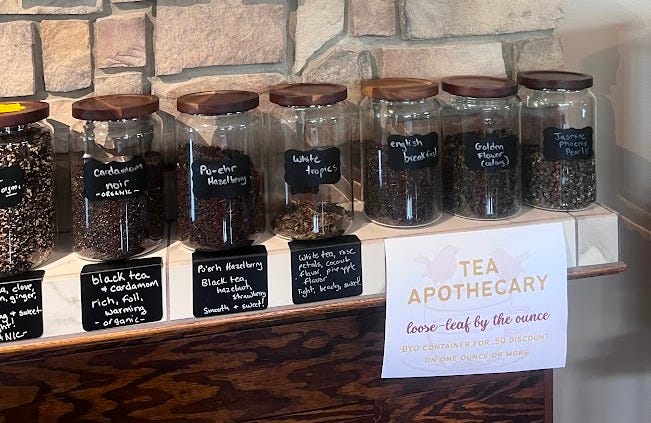The case for doing the work
We are more capable than we've been trained to believe.
For the past few days I’ve been busily brainstorming a new offering - custom tea blends - at my brick-and-mortar store.
When I first sat down to map out this idea on paper, it didn’t take long for my mind to leap to the ‘necessity’ of creating a complicated workflow of different software solutions to collect payment and schedule the consultations - which stalled out the pleasurable part of the creative brainstorm entirely.
Each piece of software would cost me money to use, and would have to be carefully linked to another in order to work properly. And then, of course, I’d still have to manage and maintain the workflow to make sure it continued to function. My task list got longer and more convoluted and the whole thing started to seem a lot less fun than talking to people about tea and making them a blend I knew they’d love.
Overwhelmed, I stopped myself and decided to go back to the basics for a moment. What, I asked myself, did I really need from this theoretical suite of services?
Well, I would need people to be able to tell me what kinds of flavors they enjoy, and the benefits they would want to get from their tea. That was pretty much it.
How remarkable, isn’t it, that I had to remind myself that I was capable of simply reaching out and asking them.
That’s just one example of a recent time I’ve had an idea, then jumped right to stressing about what software I’d need to make it work. I didn’t always think this way. Back in my early Internet days, I was always cobbling together bits of code to make something function the way I wanted to. Everything I did, no matter how cutting-edge it may have seemed at the time, employed some combination of hands-on learning and manual work. I’m not particularly technically adept, so it was even more satisfying when I was able to get things to work the way I wanted to, or at least close enough.
Over time, the available tools became a lot more sophisticated - and at some point, I left all that tinkering behind in the name of smarter automation and streamlining. The software that seemed so awe-inspiring ten or fifteen years ago, when I used Mailchimp to send out an email newsletter I’d worked on for hours, is nothing compared to being able to ask ChatGPT to write the entire thing in minutes (edited: I feel compelled to add that I do not actually do this!) Compared to the hodgepodge way I cobbled together my early podcast episodes with a combination of Skype and painstaking editing via Garage Band, today’s menu of AI-operated tools is mind-boggling.
Those tools are often useful. But they can also be a trap. More advanced software solutions have made it all seem so easy that I sometimes forget I’m still capable of learning new things, or even doing things I used to routinely handle myself. And of course, the “set it and forget it” nature of automated software can be deceptive: all those subscriptions have to be monitored for price increases and updates and terms-of-service changes and all the other things that can slip in and cause us headaches if we stop paying attention.
(Perhaps these companies would prefer it if we’d just stop paying attention?)
I’ve had a hard time putting my feelings about A.I. into words, or even fully defining my own position, which at the moment tends to fluctuate wildly between “Resist at all costs!” and “Resistance is futile!”
At no point have I felt that this technology is a net win, and yet I’ve still found myself, at times, slipping into a sort of numb acceptance of it…and even a bit of curiosity about what it might be able to do for me, if I were to just give up my last little bits of hesitancy and really dive in.
(I really appreciate
’ thoughts on artificial intelligence and her thoughtful take on what we care about, why we care about it, and how we express that care.)I guess here’s where I stand right now on both AI and other, more innocuous tools from my digital past: if I’m going to use a tech solution - whether ChatGPT or a calendar scheduler - I should use any time saved to do things that are satisfying and worthwhile and create joy in my life, like canning tomatoes, or writing, or going for a hike, or reading a book. And if I’m tempted to use the time mindlessly scrolling the internet, thereby creating an infinite loop of profit for the companies who benefit from me being online more and more - or, if I use it creating more work for myself that I don’t really need to be doing, then I didn’t need to save time to begin with.
My guess is that, most of the time, these tools don’t actually save me time over the long run, so much as they make it possible to cram more stuff I don’t really need or want to be doing into any given day. And the more we become accustomed to turning to tech to solve our problems (both real and invented) for us, the easier it is to forget how very capable we can be without them.
I still use software and tools, like the one I’m using to publish this newsletter, to assist me. But more and more, I’ve scaled back on the subscriptions and services and especially the knee-jerk reaction to reach for an out-of-the-box “solution” to relatively simple, solvable problems.
More often than not, I’ve found, the simplest and best solution is simply doing the work. And I’m more capable of it than I’ve been trained to believe.
Most of my posts here are free, but behind the paywall you’ll find exclusive content and community events like our weekly Co-Create sessions on Zoom, our private chat area, monthly podcast episodes, and more. Click below to join our peaceful, creative little haven!






Great insights!
I work in a corporate tech setting and the amount of software solutions available has gotten way out of hand. The amount of money and time spent on trying to source them, make sure everyone is happy with them, inevitably deal with the disappointments, and often end up switching and migrating again is ridiculous.
That being said once I got over my initial resistance at ai I have found a lot of fun uses for it and it has saved me time at work that I actually do spend with my family. I’m wary of the future though Cal Newport has done some good pieces on it and showed the similarities to how Facebook and instagram started as fun, low impact, value adds to people’s lives and turned into something much worse when money needed to be made.
Best of luck on the tea blends though how exciting!!!